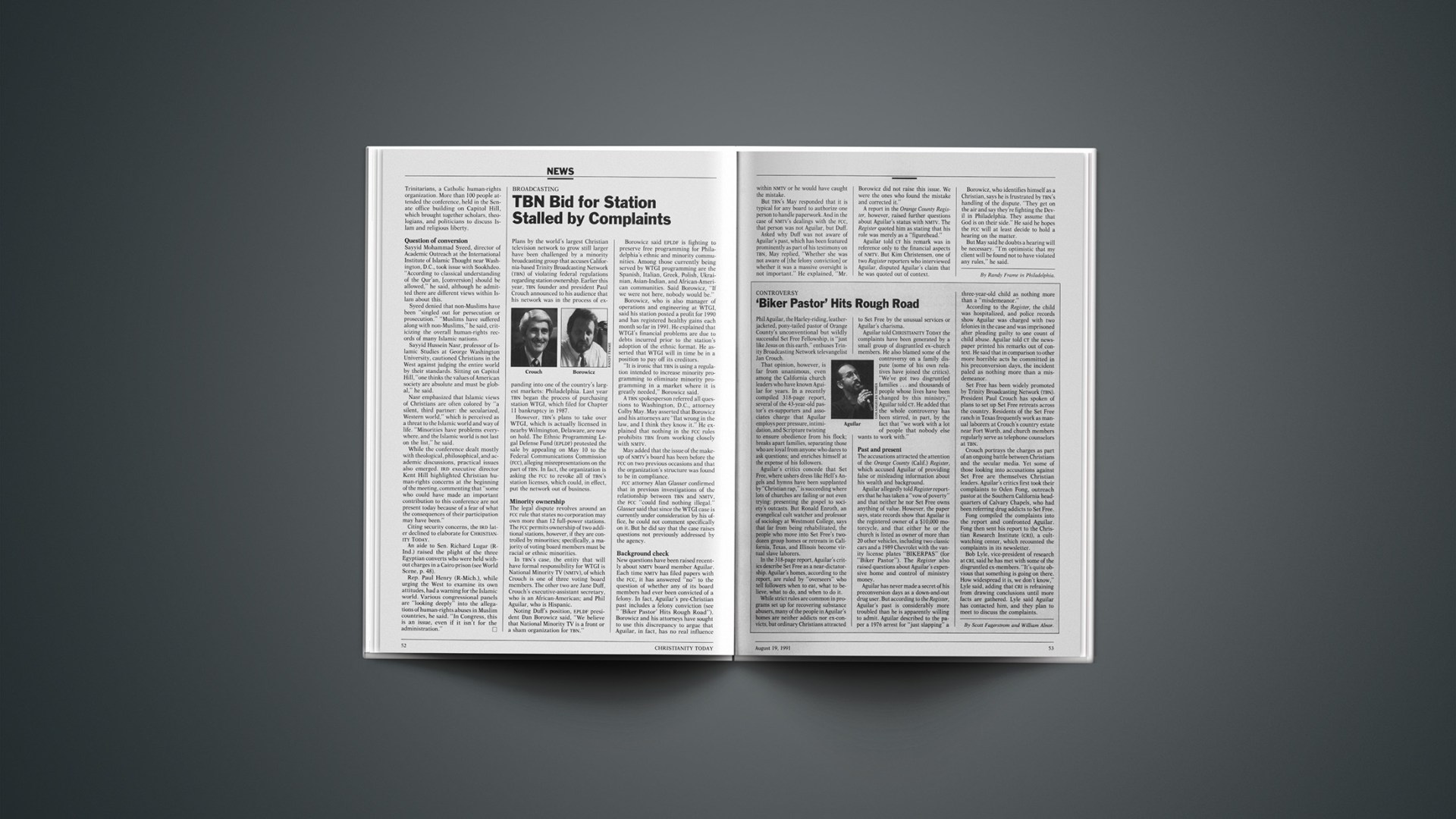Plans by the world’s largest Christian television network to grow still larger have been challenged by a minority broadcasting group that accuses California-based Trinity Broadcasting Network (TBN) of violating federal regulations regarding station ownership. Earlier this year, TBN founder and president Paul Crouch announced to his audience that his network was in the process of expanding into one of the country’s largest markets: Philadelphia. Last year TBN began the process of purchasing station WTGI, which filed for Chapter 11 bankruptcy in 1987.
However, TBN’s plans to take over WTGI, which is actually licensed in nearby Wilmington, Delaware, are now on hold. The Ethnic Programming Legal Defense Fund (EPLDF) protested the sale by appealing on May 10 to the Federal Communications Commission (FCC), alleging misrepresentations on the part of TBN. In fact, the organization is asking the FCC to revoke all of TBN’s station licenses, which could, in effect, put the network out of business.
Minority Ownership
The legal dispute revolves around an FCC rule that states no corporation may own more than 12 full-power stations. The FCC permits ownership of two additional stations, however, if they are controlled by minorities; specifically, a majority of voting board members must be racial or ethnic minorities.
In TBN’s case, the entity that will have formal responsibility for WTGI is National Minority TV (NMTV), of which Crouch is one of three voting board members. The other two are Jane Duff, Crouch’s executive-assistant secretary, who is an African-American; and Phil Aguilar, who is Hispanic.
Noting Duff’s position, EPLDF president Dan Borowicz said, “We believe that National Minority TV is a front or a sham organization for TBN.”
Borowicz said EPLDF is fighting to preserve free programming for Philadelphia’s ethnic and minority communities. Among those currently being served by WTGI programming are the Spanish, Italian, Greek, Polish, Ukrainian, Asian-Indian, and African-American communities. Said Borowicz, “If we were not here, nobody would be.”
Borowicz, who is also manager of operations and engineering at WTGI, said his station posted a profit for 1990 and has registered healthy gains each month so far in 1991. He explained that WTGI’s financial problems are due to debts incurred prior to the station’s adoption of the ethnic format. He asserted that WTGI will in time be in a position to pay off its creditors.
“It is ironic that TBN is using a regulation intended to increase minority programming to eliminate minority programming in a market where it is greatly needed,” Borowicz said.
A TBN spokesperson referred all questions to Washington, D.C., attorney Colby May. May asserted that Borowicz and his attorneys are “flat wrong in the law, and I think they know it.” He explained that nothing in the FCC rules prohibits TBN from working closely with NMTV.
May added that the issue of the makeup of NMTV’s board has been before the FCC on two previous occasions and that the organization’s structure was found to be in compliance.
FCC attorney Alan Glasser confirmed that in previous investigations of the relationship between TBN and NMTV, the FCC “could find nothing illegal.” Glasser said that since the WTGI case is currently under consideration by his office, he could not comment specifically on it. But he did say that the case raises questions not previously addressed by the agency.
Background Check
New questions have been raised recently about NMTV board member Aguilar. Each time NMTV has filed papers with the FCC, it has answered “no” to the question of whether any of its board members had ever been convicted of a felony. In fact, Aguilar’s pre-Christian past includes a felony conviction (see “ ‘Biker Pastor’ Hits Rough Road”). Borowicz and his attorneys have sought to use this discrepancy to argue that Aguilar, in fact, has no real influence within NMTV or he would have caught the mistake.
But TBN’s May responded that it is typical for any board to authorize one person to handle paperwork. And in the case of NMTV’s dealings with the FCC, that person was not Aguilar, but Duff.
Asked why Duff was not aware of Aguilar’s past, which has been featured prominently as part of his testimony on TBN, May replied, “Whether she was not aware of [the felony conviction] or whether it was a massive oversight is not important.” He explained, “Mr. Borowicz did not raise this issue. We were the ones who found the mistake and corrected it.”
A report in the Orange County Register, however, raised further questions about Aguilar’s status with NMTV. The Register quoted him as stating that his role was merely as a “figurehead.”
Aguilar told CT his remark was in reference only to the financial aspects of NMTV. But Kim Christensen, one of two Register reporters who interviewed Aguilar, disputed Aguilar’s claim that he was quoted out of context.
Borowicz, who identifies himself as a Christian, says he is frustrated by TBN’s handling of the dispute. “They get on the air and say they’re fighting the Devil in Philadelphia. They assume that God is on their side.” He said he hopes the FCC will at least decide to hold a hearing on the matter.
But May said he doubts a hearing will be necessary. “I’m optimistic that my client will be found not to have violated any rules,” he said.
By Randy Frame in Philadelphia.










